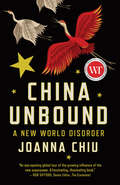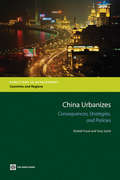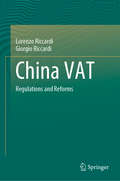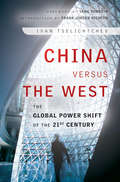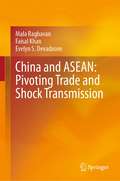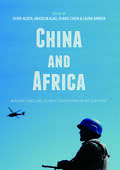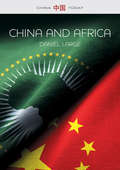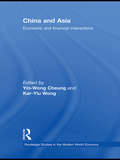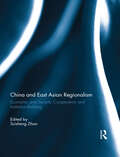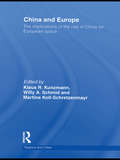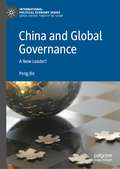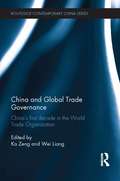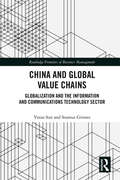- Table View
- List View
China Unbound: A New World Disorder
by Joanna ChiuWhile the United States stumbles, an award-winning foreign correspondent chronicles China’s dramatic moves to become a dominant power. As the world’s second-largest economy, China is extending its influence across the globe with the complicity of democratic nations. Joanna Chiu has spent a decade tracking China’s propulsive rise, from the political aspects of the multi-billion-dollar “New Silk Road” global investment project to a growing sway on foreign countries and multilateral institutions through “United Front” efforts. Chiu offers readers background on the protests in Hong Kong, underground churches in Beijing, and exile Uyghur communities in Turkey, and exposes Beijing’s high-tech surveillance and aggressive measures that result in human rights violations against those who challenge its power. The new world disorder documented in China Unbound lays out the disturbing implications for global stability, prosperity, and civil rights everywhere.
China Under Mao
by Andrew G. WalderChina's Communist Party seized power in 1949 after a long guerrilla insurgency followed by full-scale war, but the revolution was just beginning. Andrew Walder narrates the rise and fall of the Maoist state from 1949 to 1976--an epoch of startling accomplishments and disastrous failures, steered by many forces but dominated above all by Mao Zedong.
China Urbanizes: Consequences, Strategies, and Policies
by Shahid Yusuf Anthony SaichThe key challenges facing China in the next two decades derive from the ongoing process of urbanization. China's urbanization rate in 2005 was about 43%. Over the next 10-15 years, it is expected to rise to well over 50%, adding an additional 200 million mainly rural migrants to the current urban population of 560 million. How China copes with such a large migration flow will strongly influence rural-urban inequality, the pace at which urban centers expand their economic performance, and the urban environment. The growing population will necessitate a big push strategy to maintain a high rate of investment in housing and the urban physical infrastructure and urban services. To finance such expansion will require a significant strengthening and diversification of China's financial system. Growing cities will greatly increase consumption of energy and water. Containing this without at the same time constraining the economic performance of cities or the improvement in the standards of living will call for enlightened policies, strategies, careful urban planning, and significant technological advances. This volume identifies the key developments to watch and discusses the policies which would affect the course as well as the fruitfulness of change.
China VAT: Regulations and Reforms
by Lorenzo Riccardi Giorgio RiccardiThis book clearly chronicles the evolution of Chinese VAT regulations, with a particular focus on the reforms of recent years. Covering all the provisions of the laws related to VAT, it also provides examples and implementation instructions. Practically structured and easy to consult, it allows readers to quickly find answers to questions that may arise in the course of their work. As such, the book is a valuable tool for accountants, advisors, lawyers, public officials and anyone working in the sector.
China Vanke (A-1)
by Lynn S. Paine John D. Macomber Keith Chi-ho WongAs China's largest homebuilder, China Vanke Co. Ltd. (Vanke) was facing an industry downturn sparked by strong government intervention. Faced with falling prices, Vanke's president must decide whether to keep the company's pricing and product positioning intact, and how aggressively to pursue its greener building strategy. Follow-up cases present additional decisions, including how, and how aggressively, to improve safety and quality (A-2), and whether to expand into other asset classes, such as commercial real estate.
China Vanke (A-2)
by Lynn S. Paine John D. Macomber Keith Chi-ho WongChina Vanke's president and his team must decide on a plan of action after reviewing the quality issues the company faced in early 2012 after a series of highly publicized incidents concerning the quality of the homes they built.
China Vanke (A-3)
by Lynn S. Paine John D. Macomber Keith Chi-ho WongChina Vanke's president is considering whether and how the company might make further inroads into the commercial real estate sector, while continuing to lead in the residential sector. He is also considering whether to branch into overseas residential markets such as Hong Kong, Singapore, and the United States.
China Vanke (B)
by Lynn S. Paine John D. Macomber Keith Chi-ho WongThe case describes Vanke's response to the decisions posed in the A1, A2, and A3 cases and asks whether Vanke should expand its strategic scope by defining itself as an "urban facilities provider" rather than a "residential housing developer." The management team is also reviewing the company's forays in places such as Hong Kong, Singapore, the U.S., and Europe.
China Vanke: Battle for Control (A)
by Lynn Sharp Paine Dawn Lau Charles C.Y. Wang Anthony K. WooCase
China Vanke: Battle for Control (B)
by Lynn Sharp Paine Dawn Lau Charles C.Y. Wang Anthony K. WooChina Resources expresses disagreement over the validity of the results of the board vote as announced by China Vanke. It further raises objections to Vanke's handling of the announcement as well as reiterates its doubts about the strategic rationale of the proposed transaction.
China Vanke: Battle for Control (C)
by Lynn Sharp Paine Dawn Lau Charles C.Y. Wang Anthony K. WooBaoneng calls for the removal of China Vanke's board of directors, citing as reasons the directors' mishandling of the Shenzhen Metro proposal as well as the company's various breaches of corporate governance requirements. Vanke defends itself against Baoneng's allegations, and also responds to the Shenzhen bourse's inquiries regarding the validity of the board vote.
China Vanke: Battle for Control (D)
by Lynn Sharp Paine Dawn Lau Charles C.Y. Wang Anthony K. WooIn the battle for control over China Vanke, the Chinese securities regulator steps in to censure Vanke and Baoneng for acting against the interests of the market and minority shareholders. The Chinese insurance regulator also finds Baoneng to be in violation of insurance regulations, and subjects its insurance arm to severe restrictions on further sales of its products. A rival private property developer, China Evergrande, also joins the fray, buying enough shares to become Vanke's third largest shareholder. The case finally relays how the battle for control winds down and the eventual resolution.
China Versus the West: The Global Power Shift of the 21st Century
by Ivan TselichtchevChina Versus the West is an innovative book. The author, a leading specialist on the international and Asian economy and business, presents the most comprehensive picture of the changing power balance between the emerging superpower China and the "old" developed economies of the West: mainly the US, Europe and Japan. The reader can clearly see in what areas and to what extent China has become the world leader, in what areas it is catching up and in what areas the West retains its superiority and has a chance to strengthen it further. At the same time, I. Tselichtchev unveils a breath-taking story of the global economy and business in the brave new world which is non-"West-led" and where major growth dynamics are coming from large emerging economies. A radically changing economic environment requires new government policies and business strategies. The book contains many valuable suggestions and ideas. Using his own analytical framework, the author presents a set of options and alternatives for Western businesses in the wake of China's production and export offensive. The book provides a uniquely sharp and thought-provoking analysis of the factors behind the global crisis of 2008-2009, largely different from what we see in other publications, and examines its implications for the global power balance. I. Tselichtchev vividly shows that it was not global, but Western crisis of a structural character which drastically changed the China-West power balance in the former's favor. He provides strong arguments showing that today's China is structurally and macro-economically stronger than most countries of the West. This leads him to rethinking the very essence of the Chinese model of capitalism and to its new definition. He expresses unconventional, sometimes controversial, but well-founded views about China's problems and weaknesses and the prospects for its political evolution. The book ends with invaluable insights into China's unique role in the world economic history, the essence of the non-"West-led" multipolar world and the positions of its major players. Arguing that from now on no single country will be ever able to "rule the world", it shows new opportunities dynamic China is opening for the West. Thoroughly analyzing and discussing a wide range of the key, often complicated issues which are now in the focus of the world's attention, the book remains very reader-friendly. It is written in the form of an unconstrained dialogue with the reader, containing a lot of the author's on-the-spot impressions, interesting facts, remarks and quotations. China Versus the West is a must reading for everyone who wants to know more about the global developments, China and the West, and also, perhaps, to get valuable inputs and hints to find his or her own place in today's new world. It is highly recommended for policy-makers, business people, academics, analysts and journalists. It is a valuable source for professors and students of the universities and business schools.
China Yintai: Developing Shared Value in China
by Christopher Marquis Ying Zhang Shiyu YangUnder the leadership of CEO and President Shen Guojun, China Yintai was increasingly committed to philanthropic initiatives. Drawing upon his experience as an entrepreneur and a philanthropist, Mr. Shen saw the urgent need to build bridges between business practices and philanthropy and cultivate a new business culture that incorporated "shared value." The case study documents Yintai's recent collaboration with Peking University on founding China's first masters program of social enterprise management. By training management professionals for China's philanthropy sector, Yintai and Mr. Shen expected to bring about revolutionary impact in the long run and change the face of China's philanthropy.
China and ASEAN: Pivoting Trade and Shock Transmission
by Mala Raghavan Faisal Khan Evelyn S. DevadasonThis book highlights the critical relationship between China and the Association of Southeast Asian Nations (ASEAN) associated with its trade interdependency. As the largest trade partner in the region, China has not only presented itself with opportunities for ASEAN to tap its market, but also created great challenges for the region. The fundamental question that this book addresses, therefore, is whether China’s engagement with ASEAN comes at a cost for the latter following from the systemic risks tied to the China-centric supply chains in the region. The trade interactions between China and ASEAN, though extensively explored, are less understood in the context of its influence over the region amidst the recent changing dynamics that follow from China’s global engagement and backlash from major powers. The book therefore resolutely rises against stereotypes and clichés, making readers reconsider many oversimplified assumptions of the benefits of trade engagement where economies are interconnected through complex production chains.
China and Africa: Building Peace and Security Cooperation on the Continent
by Abiodun Alao Chris Alden Zhang Chun Laura BarberAddressing the key issues in contemporary China-Africa relations, this title moves beyond narrow media-driven concerns to offer a survey of China's return to Africa, examining what this new relationship holds for diplomacy, trade and development.
China and Africa: The New Era (China Today)
by Daniel LargeChina has gone from being a marginal to a leading power in Africa in just over two decades. Its striking ascendancy in the continent is commonly thought to have been primarily driven by economic interests, especially resources like oil. This book argues instead that politics defines the ‘new era’ of China–Africa relations, and examines the importance of politics across a range of areas, from foreign policy to debt, development and the Xi Jinping incarnation of the China model. Going beyond superficial depictions of China’s engagement as predatory or benign, this book explores how Africa is – and isn’t – integral to China’s global ambitions, from the Belt and Road Initiative to strategic competition with the United States. It demonstrates how African actors constrain, shape and use China’s engagement for their own purposes. As China seeks to protect its more established interests and Chinese citizens, it also shows how security has become a particularly notable new area of engagement. This innovative book provides a comprehensive and up-to-date guide to contemporary China–Africa relations. It will be essential reading for students and scholars working on global politics, development and international relations.
China and Asia: Economic and Financial Interactions (Routledge Studies in the Modern World Economy)
by Kar-Yiu Wong Yin-Wong CheungIt is difficult to overstate the growing importance of China and Asia in the global economy. Despite the sharp downturn experienced in the 1997 financial crisis, China and Asia have bounced back strongly in the new millennium and delivered solid economic growth. In this book, Ying-Wong Cheung and Kar-Yiu Wong have gathered together 35 renowned researchers from four continents to examine contemporary issues on the economic and financial interactions with a focus on China and Asia. Four broad areas are discussed. The first part deals with China and her interactions with other economies, the second with economic interactions within the region, the third with foreign exchange rate issues facing Asian economies, and the fourth with financial market development in the region. Within these chapters, some interesting results are explained, many of which differ from what is commonly believed. For example it is explained how exports from China and other Asian economies follow the "flying geese’ pattern and that these economies can grow in harmony; that appreciating the Asian exchange rates would not have much impact on their current account surpluses; that financial liberalization in Thailand did not create the short-term debt problem, which is believed to a major cause of the 1997 financial crisis. It is also described how developments in the US have very strong influences on Asian economies and that Mainland China was a less important source of external shocks than is commonly held.
China and East Asian Regionalism: Economic and Security Cooperation and Institution-Building
by Suisheng ZhaoTo convey the image of a responsible power willing to contribute to regional stability and cooperation, China has shifted from a single-minded preference for bilateralism to an active participation in East Asian regionalism in the recent decades. This development has inspired discussions over whether a rising China could play a leadership role in building an institutionalized architecture for regional cooperation in East Asia. Nevertheless, this has not happened as East Asian regional cooperation and relevant activities remain mostly ad hoc and informal, especially when compared to regions such as Europe.To what extent has China contributed or constrained the development of regionalism in East Asia? What are China’s desired roles and objectives in East Asian regional cooperation? What is the level of trust that other regional players have for China in regional cooperation? This book seeks answers to these questions by exploring China’s motivations and strategic calculations as well as its policy practices in East Asian economic and security cooperation.This book was published as a special issue of the Journal of Contemporary China.
China and Europe: The Implications of the Rise of China for European space
by Klaus R. KunzmannChina and Europe address the challenges for the cities and regions of Europe that may be the consequences of such development trends. Contributions by policy-makers and academic observers will prepare the ground for debating the dimensions ‘economy’, ‘knowledge and culture’, ‘environment and mobility’, ‘quality of life’, and ‘governance’ of this challenge.
China and Global Governance: A New Leader? (International Political Economy Series)
by Peng BoThis book proposes a new concept of “International Leadership with Chinese Characteristics” (ILCC) to interpret China’s role in global governance. The author illustrates how the concept of ILCC is built on the basis of the discussion of Chinese political culture and Chinese worldview of international relations and develops a four-step interpretive process as a guidance for conducting the empirical analysis of the ILCC. The book also shows how Chinese elites conceptually construct and practically implement the ILCC in four case studies – G20, BRICS, Shanghai Cooperation Organization (SCO), and Belt and Road Initiative (BRI)
China and Global Trade Governance: China's First Decade in the World Trade Organization (Routledge Contemporary China Series)
by Ka Zeng Wei LiangChina's historic accession to the World Trade Organization (WTO) in November 2001 not only represents an important milestone in the country’s transition to a market economy and integration into the global economy, but is also among the most important events in the history of the WTO and the multilateral trading system. China and Global Trade Governance: China's First Decade in the World Trade Organization provides us with some fresh empirical data to assess the country’s behaviour in the liberal international economic regime. Such an assessment is both timely and necessary as it can help us better understand China’s role in the evolving structure of global economic governance, in addition to shedding light on the broader debate about the implications of the rise of China for the international system. Through a thorough examination of China’s WTO compliance record and its experience in multilateral trade negotiations, this book seeks to better understand the sources of constraints on China’s behaviour in the multilateral trade institution as well as the country’s influence on the efficacy of the World Trade Organization. In doing so, this project speaks directly to the following questions raised by China’s unprecedented ascent in the international system: Is China a rule maker, rule follower, or rule breaker in international regimes? Is Beijing a responsible stakeholder capable of making positive contributions to global trade governance in the long-term?
China and Global Value Chains: Globalization and the Information and Communications Technology Sector (Routledge Frontiers of Business Management)
by Yutao Sun Seamus GrimesPresident Trump has raised the intriguing question of bringing the manufacturing of companies like Apple back from China to the U.S. This book, however, argues that in this age of the knowledge-based economy and increased globalization, that value creation and distribution based on knowledge and innovation activities are at the core of economic development. The double-edged sword of globalization has transformed China’s economic development in the past few decades. Although China has benefitted from globalization and is now the second largest economy in the world, having become a global manufacturing power and the biggest exporter of high-tech products, it continues to be highly dependent on foreign sources of capital and technology. This book will explore the core of the Chinese economy from the perspective of the Global Value Chain (GVC), combining analysis of inward investment, international trade, Science and Technology and Innovation (S&TI) and economic development. Specifically, it investigates China’s evolving role in GVCs with some innovative Chinese companies emerging in the global market and China’s ongoing efforts to become an innovation-driven economy. China’s impressive economic record and experience provides an impressive role model for other developing countries.
